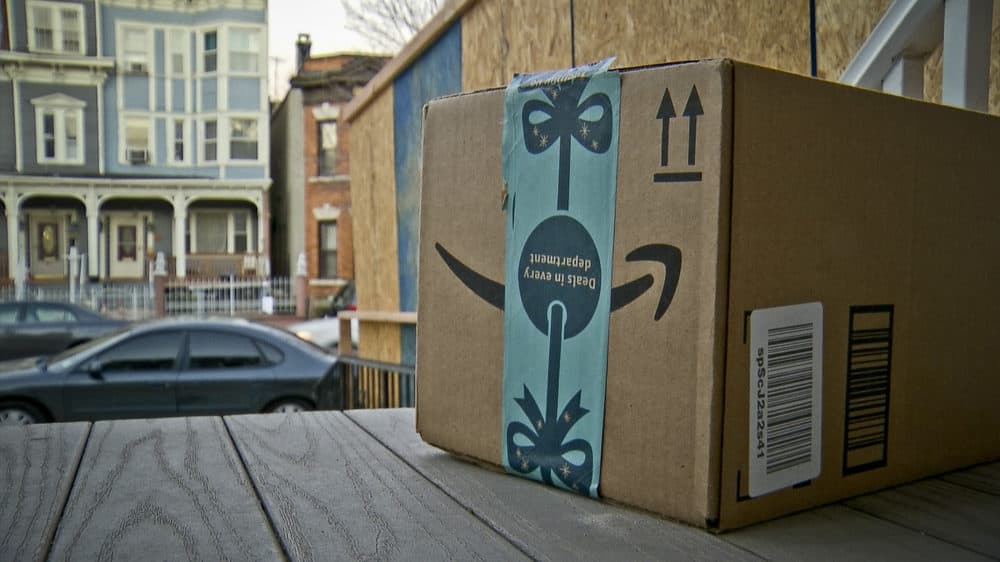Advertisement
Commentary
My Month Without Amazon

When I told friends I was giving up Amazon for the month of December, they thought I was nuts. “Why would you do that?” they asked, practically in a chorus.
It’s a fair question. As a working mother of three, I rely on Amazon for all sorts of things. I don’t have to worry about going to the hardware store to pick up a particular kind of light bulb or to Target for new sippy cups, I just order the stuff instead. (Me, and 101 million other Amazon Prime members in the U.S.) In the last six months, I’ve ordered 57 items, which sounds like a lot, but kid socks and baby wipes add up quick — seriously, take a peek at your own order history.
For years, I’d been successfully ignoring all the disturbing reports about Amazon’s macho work culture, potential monopoly issues and privacy infractions. I’d read the latest bombshell, feel bad for a little while and then keep shopping. Like so many others, I’m trapped by the “economy of cheap convenience.” The tipping point, for me, was a story about the grave human toll of delivering me a bamboo shoe rack in two days or less. “That’s it,” I said, “no more” — or, at least, no more for a month.
But what began as a moral stand, albeit a short one, turned out to be something else.
The algorithm-driven hyper-curation we’re accustomed to (and rely on) ensures that almost nothing we read, listen to, watch or buy, is by accident.
My husband and I aspire to have a very modern marriage — an “equal partnership” — but I’ve still wound up to be the household cruise director. If our life is a puzzle of 100 pieces, I cobble 80 of them together and he places the final 20. I decide what we eat, get the laundry done, water the plants, manage child (and dog) care, pay bills, make doctor and dentist appointments, send thank you notes and make sure the kids have snow boots that fit and clean sheets on their beds, among other things. I also work part-time and freelance on the side.
I’m grateful for a full life, but the whole thing can be exhausting. Then again, a near-crushing mental load piled on a second-shift of emotional labor is what it means to be a woman who has-it-all in America, right? Almost all of my friends would tell a similar story.
This is why giving up Amazon, even for just a month, felt like such a big deal.
Advertisement
The first few days, I did feel the tug of Prime. I worried about getting all my Christmas shopping done. I grumbled about having to pick up an extra set of lights for our tree.
But as the days rolled on, something shifted.
I realized that the time Amazon “saves” doesn’t actually translate into free time for me. Instead, it gets gobbled up by my own reflex to be productive. It’s not like I read a novel because I don’t have to run out for diapers, I check email and clear off my kitchen island for the 47th time.
It also quickly became clear that life without Amazon was a little more interesting, or at least a little more serendipitous. The algorithm-driven hyper-curation we’re accustomed to (and rely on) ensures that almost nothing we read, listen to, watch or buy, is by accident. I think we pay for all this tailor-made convenience by polluting the free space in our heads.
In my pre-kid days, I spent time wandering, discovering people, places and stuff I didn’t know I was looking for. But, I don’t wander into many things anymore: I plan them. "Doing nothing” is rare because I’m scheduled to within an inch of my life. It's not just on weekdays, when I skid into the parking lot at 5:58 p.m. to pick my kids up from preschool, but weekends, too, when my husband and I engage in high-stakes negotiations about who’s going to do what, when.
Without Amazon, I was definitely less efficient, but I was also happier. I spent a few hours alone, concentrating on just one thing, without the lingering angst and temptation that I could, or should, be doing something else. I got to bump into things like I used to. And Christmas shopping in-the-flesh felt more thoughtful — less like checking boxes on yet another to-do list (though, I had a list — of course, I had a list).
Without Amazon, I was definitely less efficient, but I was also happier.
The experiment that started as a minor political statement, turned into a campaign against the pressure and opportunity to optimize my every move.
I only cheated once during my Amazon-free month: in a weak moment, I ordered hair product. (And my mother in law, who lives on the West coast, sent us about a bazillion Amazon boxes during the holidays — but she didn’t know what I was up to.) I’d like to say I have the fortitude to quit for good, but I don’t. It’s too easy.
Just this week I had to replace a toddler hat and buy a book I couldn’t find at my local bookstore. Quitting Amazon altogether wouldn’t make my life better, but being more thoughtful about how I use the time it saves me probably would.
We’re having a birthday party for my older kids tomorrow and I just realized I forgot the goodie bags. I’ll be right back — I have to run out for just a minute.
